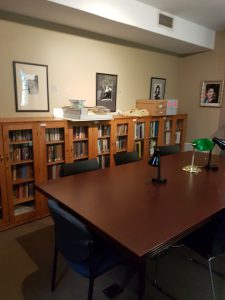
One of the highlights for me at this year’s Archives Association of Ontario conference was the tour of the Canadian Lesbian and Gay Archives (CLGA) located in Toronto. The CLGA was amazingly well represented at AAO with two of their staff members presenting, a site tour on the conference program, and numerous CLGA volunteers involved in the conference.
The CLGA tour included an interesting discussion of the history of the organization – the early grassroots connection to Pink Triangle Press, police raids of archival collections, and the challenge of gaining recognition as an archive and as a non-profit organization. Jade Pichette, the Volunteer and Community Outreach Coordinate led the tour I was on and they did an excellent job of integrating stories of resilience, community history, and challenge into the tour.
It was also intriguing to see what the CLGA has done to cope with it’s location in a historic house and to work around challenges of space, lack of environmental controls, and accessibility. I love the fact that CLGA is also a community space and has partnered with other organizations to put on artistic performances in their space, allow meeting space to be used by community groups, and create other engagement opportunities within their space. Similarly, I was impressed by the movement to reach people where they are – and put CLGA collections in other visible community spaces through exhibitions and programming.
The tour also allowed for a peak at the range of material held by CLGA. The archive has an extensive archival collection but it also has a well developed library, poster collection, audio-visual holdings, portrait collection, vertical file/clippings collection, and a reading room. The range of the material in the archive also speaks to the ephemeral nature of much Queer* history, the event orientation nature of some community collections, and the value of saving community memories associated with mediums other than paper.
Personally, I was also really happy to see that the CLGA tour also started with introductions and provided participants a chance to express their preferred pronouns. The CLGA staff were also very active on Twitter throughout the AAO conference and encouraged folks to add their pronouns to their name tags.
Hey #aao17conf 1 way for us to be inclusive to trans folks is by writing our pronouns on our name tags she/her, he/him, they/them etc
— CLGA (@CLGArchives) April 27, 2017
The seemingly small change to adding pronouns to name tags can be huge and can go a long way to make begin to make conference spaces more welcoming for trans, non-binary, gender fluid, and other folks. This is something I would really like more organizations to take note of include in plans for upcoming events.
